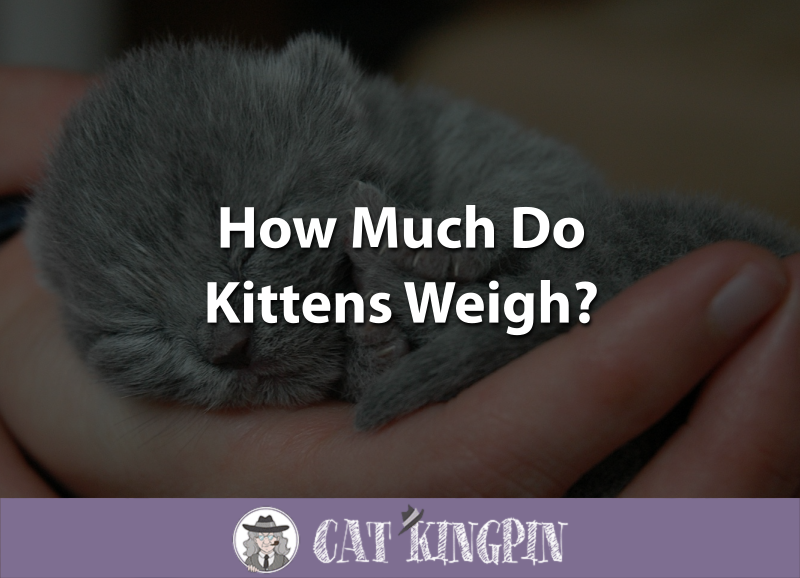How Much Do Kittens Weigh?
With kittens, especially young ones, weight is an important measure of overall health. Small kittens often are diagnosed as “failing to thrive” which can be a serious health problem that can even lead to death.
Knowing how much kittens should weigh at each stage of their development and keeping track of your kitten’s weight is an important component of kitten ownership.
In this article we’ll cover the following:
- How Much Do Kittens Weigh?
- How to Weigh a Kitten
- What to Do If Your Kitten is Underweight
How Much Do Kittens Weigh?
From the time they are born until they reach one year of age, a kitten’s weight will change drastically.
At birth, a healthy kitten will weigh anywhere from 3-5 ounces (or roughly 100 grams). From the moment they arrive in the world, kittens undergo a period of rapid growth and will gain about half an ounce (or 14 grams) per day.
By the time they are seven days old they should have doubled their birth weight and will triple it by the time they are three weeks old.
By the time a kitten arrives in their new home, at about eight weeks of age, they should weigh between 1.5 to 2 pounds (0.5 – 1 kg), with male kittens weighing slightly more than their female counterparts. If your kitten is significantly smaller than this your vet will try to determine the reason when you bring them for their first checkup.
Because they are growing so quickly, you need to feed your kitten a high-quality diet. You should look for a food specifically made for kittens that lists meat as the first ingredient. Blue Wilderness Kitten is a great choice because it is made from high-quality meat, digestible carbohydrates, and is designed for growing kittens.
While many kittens find wet food more enticing that dry food, kibble is usually the better choice because it helps with dental hygiene. Also, getting your kitten used to eating exclusively wet food is a good way to raise a picky adult cat.
Some kittens, especially if they are the runt of the litter, will be on the small side. For some kittens this is totally normal and not necessarily indicate something is wrong.
Kitten size can vary drastically from kitten to kitten. Some breeds of cat are heftier than others, so a one-year-old Maine Coon kitten may weigh significantly more than a one-year-old Siamese, for example. Knowing what’s normal for your specific kitten is essential for keeping track of their health.
It’s important to note, however, that a kitten’s weight should consistently increase. Any sharp decrease in your kitten’s weight is cause for concern and you should immediately bring them to the veterinarian.
As long as your kitten is steadily gaining weight as they grow older you shouldn’t have anything to worry about. If your kitten is eating, drinking, and eliminating normally their weight should steadily increase.
If you see a large spike in your kittens weight, it’s possible they are pregnant and you need to make sure you check for this.
How to Weigh a Kitten
While your veterinarian will weigh your kitten at each appointment, it’s not a bad idea to periodically weigh your kitten at home as well. This is especially important if you have a litter of very young kittens and you want to track their growth.
Because weight fluctuations, particularly decreases, can be a sign that something is wrong with your kitten’s health, it’s a good idea to have a basic understanding of how much your kitten weighs and how much they should weigh.
With enough practice, you may be able to weigh your cat using your scale at home. However, it’s much easier to simply purchase a scale specifically made for animals, such as the ZIEIS Digital pet scale.
Placing your kitten directly on the scale is the most accurate way to weigh them. Getting an accurate reading is crucial when kittens are young, as every ounce is meaningful.
Check out this video which offers helpful tips on weighing your kitten safely and accurately.
What to Do If Your Kitten is Underweight
You should take action immediately if you notice your kitten is losing weight or not gaining as they should.
Weight loss, coupled with other symptoms such as tiredness and listlessness, can be a sign of “fading kitten syndrome,” a serious pathology and one of the biggest causes of death in young kittens.
You should always follow your veterinarian’s advice when it comes to helping your kitten gain weight. Making sure they are eating enough food is the first step. If your kitten is still very young and not yet weaned, this may mean that you have to bottle feed them.
If this is the case, you will need to purchase special supplies. Don’t feed your kitten cow milk or goats milk, as they need a simulated cat milk in order to thrive. You will also need to purchase a kitten nursing kit, which contains a bottle, various sizes of nipples, and a cleaning brush.
If your kitten fails to gain weight or loses weight, you shouldn’t experiment at home and try to cure them on your own. Undernourished or sickly kittens can die very quickly if they aren’t given proper veterinary attention. The best course of action is to bring them to the vet and then follow the veterinarian’s instructions carefully.
This little kitten is enjoying a bottle.
So, how much do kittens weigh?
When they are born, kittens weigh a mere 3-5 ounces. But, they grow quickly! Kittens will triple their weight in the span of a few short weeks. By the time they turn one year old, most kittens will weigh between 8-10 pounds. Remember that some breeds of cat will weigh more than that!
If you have a litter of kittens, you should buy a pet scale, such as the ZIEIS Digital pet scale, to keep track of each kitten’s weight as they grow. Even if you only have one kitten, it’s not a bad idea to have a scale on hand anyway, as weight is an important indication of feline health and wellness.






